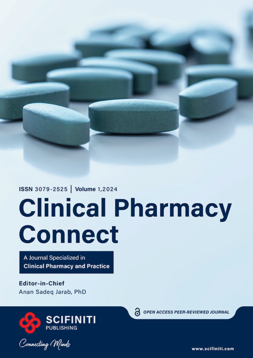
APA Style
Anan Jarab. (2025). Clinical Pharmacy at the Crossroads: Advancing Care, Improving Outcomes. Clinical Pharmacy Connect, 1 (Article ID: 0001). https://doi.org/10.69709/CPC.2025.133111MLA Style
Anan Jarab. "Clinical Pharmacy at the Crossroads: Advancing Care, Improving Outcomes". Clinical Pharmacy Connect, vol. 1, 2025, Article ID: 0001, https://doi.org/10.69709/CPC.2025.133111.Chicago Style
Anan Jarab. 2025. "Clinical Pharmacy at the Crossroads: Advancing Care, Improving Outcomes." Clinical Pharmacy Connect 1 (2025): 0001. https://doi.org/10.69709/CPC.2025.133111.
 ACCESS
Editorial
ACCESS
Editorial
Volume 1, Article ID: 2025.0001

Anan Jarab
anan.jarab@aau.ac.ae
1 College of Pharmacy, Al Ain University, Abu Dhabi 112612, United Arab Emirates
2 AAU Health and Biomedical Research Center, Al Ain University, Abu Dhabi 112612, United Arab Emirates
3 Department of Clinical Pharmacy, Faculty of Pharmacy, Jordan University of Science and Technology, Irbid 22110, Jordan
Received: 05 Feb 2025 Accepted: 05 Feb 2025 Available Online: 19 Feb 2025 Published: 07 Mar 2025
Clinical pharmacy has evolved from a field that focuses on the dispensing and distribution of medications to a modern, colossal field that is imperative to the patient-driven care [1,2]. Clinical pharmacists play a multifaceted and crucial role in patient care via integrating knowledge and skills into clinical practice, thereby contributing to improved health outcomes. Specifically, they design tailored pharmacotherapy that matches patients’ needs, with a focus on ensuring medication safety and effectiveness [3].
Technological advancements are revolutionizing the field of clinical pharmacy. Clinical decision support systems and digital health tools are propelling advances in drug management by facilitating evidence-based, real-time decisions that enhance treatment efficacy and patient safety. By predicting patient outcomes, identifying drug interactions, and optimizing medication schedules, these techniques support more effective and individualized care [4,5]. By enabling remote consultations and medication monitoring, telepharmacy expands the accessibility of pharmacists to underprivileged areas, especially in places with limited access to healthcare. Clinical pharmacy practices, however, are still primarily concerned with medication dispensing in many poor nations, particularly some regions of the Middle East, with little integration into multidisciplinary care teams. Restrictions in workforce development, education, and access to cutting-edge technologies hinder clinical pharmacy's ability to fully improve patient outcomes in these areas. By removing these obstacles, clinical pharmacy practice could improve and patient care could reach new heights.
Looking forward, there are great opportunities for clinical pharmacy in the future. Pharmacists are increasingly taking the lead in areas such as value-based care and cost-effective medication management. Their expertise in pharmacoeconomics and patient-centered care significantly enhances clinical outcomes and reduces healthcare expenses. Clinical pharmacists' growing position in multidisciplinary teams guarantees the development of thorough treatment plans and promotes cooperation with other medical specialists. Clinical pharmacists' abilities in patient counseling, communication, and customized treatment plans will be even more important as healthcare shifts toward humanistic care. Pharmacists will be positioned as important participants in the healthcare industry of the future as long as education and training continue to advance, focusing on the integration of technology, data analytics, and collaborative care models. In addition to improving patient outcomes, increasing clinical pharmacy involvement would increase efficiency, which would reduce costs and enhance healthcare delivery.
As the clinical pharmacy industry evolves, being abreast of the most recent developments, research, and best practices is crucial. In this context, platforms like Clinical Pharmacy Connect are essential. To assist pharmacists, Clinical Pharmacy Connect is an open-access, peer-reviewed website that provides the most recent research, advancements, and industry trends. It talks about the rapid advancements in medicine and technology, giving pharmacists useful knowledge on topics including digital health, pharmacovigilance, patient-centered care, and interprofessional collaboration. Clinical Pharmacy Connect aims to foster a collaborative environment that supports the continuous advancement of the field by encouraging communication among researchers, legislators, and clinical pharmacy specialists.
The authors declare no conflicts of interest regarding this manuscript
I would like to thank Mr. Ahmad Al Meslamani for his support and contributions.
We use cookies to improve your experience on our site. By continuing to use our site, you accept our use of cookies. Learn more